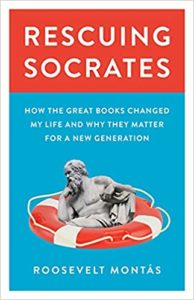
How do books change our lives? In this episode, host Russ Roberts welcomes Columbia University professor Roosevelt Montás to help answer that question and to talk about his new books, Rescuing Socrates. Montàs directed Columbia’s Core Curriculum program for many years, and remains a fierce advocate of the liberal arts- something he sees as valuable for all students, whether formal or informal settings. He shares his inspiring personal story, and offers all of us a great deal to think about- and read!
What makes Columbia’s core curriculum so unique? How broadly applicable is it; is it just an Ivy League thing, or is there something we can all benefit from? If so, where and how might we do so?
Montàs puts a great deal of emphasis on the discursive nature of the liberal arts. So let’s keep the learning and the conversation going. As always, we love to hear from you.
1- Why do the liberal arts seem so out of favor today? Is it simply a question of “bad marketing,” as Roberts suggests? Are the liberal arts and the model of the modern research university incompatible? (You might think here about the role of the non-expert professor leading the liberal arts courses at Columbia. To what extent is there value in learning with someone who holds no particular expertise in the field?)
2- Roberts suggests we look to where the word “liberal” in liberal arts comes from, as a notion of freedom is part of its origin. What does Roberts mean when he says this sort of education is something everyone has to figure out for themselves? What is the role of freedom in a liberal arts education?
3- Montàs tells a story about four thinkers who profoundly influenced him: Freud, Ghandi, Plato, and Augustine. What is your experience with these thinkers? Who would you choose to answer the question of the most influential thinkers in your life, and why?
4- Unsurprisingly, the question of dead white men and the western canon arises. What does Montàs mean when he suggests we run the risk of conflating diversity with chronological order? How did you react to his claim that, “…one of those great values is that we can see in those ancient texts–in those minds and writers from a different world, a different time, a different class, a different culture than our own–we can see what is fundamentally human.”
5- Why are liberally educated people better for a democracy? Montàs says, “…I wouldn’t blame the crisis in our political discourse, kind of the discursive crisis in which America finds itself today–I wouldn’t blame that on higher education. But I would say that higher education has failed to make its contribution to preventing that.” What does this mean? What should be the role of higher education in shaping our political discourse?


Comments are closed.